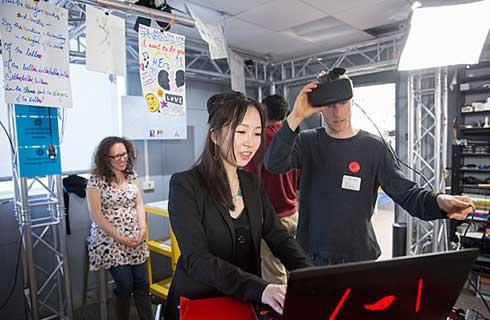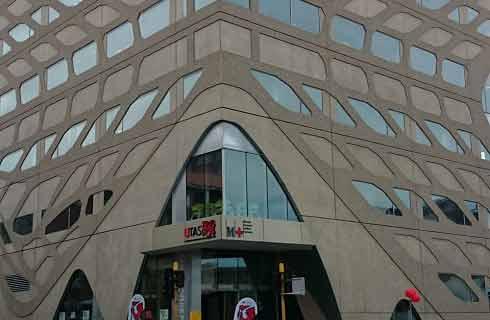生物医学科学学士-免疫学(荣誉学位)
BSc (Hons) in Biomedical Sciences (Immunology)

学历文凭
Bachelor Degree with Honours

专业院系
Life Sciences

开学时间

课程时长

课程学费

国际学生入学条件
IDP—雅思考试联合主办方

雅思考试总分
6.0
- 雅思总分:6
- 托福网考总分:77
- 托福笔试总分:160
- 其他语言考试:Pearson: 59 (59 in all sub scores)
CRICOS代码: C550
申请截止日期: 请与IDP联系 以获取详细信息。
课程简介
Often credited as the ‘father of immunology’ Edward Jenner is said to have saved more lives than any other human being through his discovery of the smallpox vaccine. Modern study of immunology is an exciting and fast moving area of biomedicine and remains an extremely rewarding one to be part of. At Brunel, we understand that your specialist knowledge should be built on a sound grounding of all the areas of biomedical sciences. This means that your first year will cover areas such as the human body, biochemistry and research skills. As you continue through your degree, you'll study specialist areas that will give you a greater understanding of the role of the immune system. You’ll learn about how the human defence system helps to prevent disease and you’ll focus on how this can fail through deficiencies in immunity. And if you change your mind about your specialist area, don’t worry. The flexibility of our course at Brunel means that you can switch to another specialist pathway in the second year or even take the general Biomedical Sciences BSc.<br><br>Careers and your future<br>As a graduate in Biomedical Sciences (Immunology) you’ll have the skills to work in research and in clinical specialities in areas such as autoimmune disorders or antibody deficiencies. You may choose to work in a hospital laboratory, an academic research setting or in industrial research.<br>Whatever your future goals are, this course is focused on helping you achieve your career ambitions. The employability teaching blocks at Brunel provide a personalised approach to developing your skills. You’ll work on improving your CV and your interview techniques, as well as attending careers events and carrying out research projects with academics. Each year, we hold a Biomedical Sciences Careers Fair where you’ll have the opportunity to network with some of the biggest names in the business such as GlaxoSmithKline, Great Ormond Street Hospital, Parexel, Age UK and Royal Brompton Hospital NHS Foundation.
相关申请
 预科
预科 奖学金
奖学金 实习机会
实习机会 在校学习
在校学习 跨境学习
跨境学习 校园授课-线上开始
校园授课-线上开始 在线/远程学习
在线/远程学习
开学时间&学费
学费信息仅供参考,请与IDP联系以获取详细信息
| 开学时间 | 时长 | 学费 | 地点 |
|---|---|---|---|
| 暂无 | 暂无 | 暂无 | 暂无 |
学校排名

世界排名401
数据源:
泰晤士高等教育世界大学排名
关于伦敦布鲁内尔大学

伦敦布鲁内尔大学是英国一流的大学,位于伦敦西区的乌克斯桥。该校全球闻名,因出色的课程、先进的国际视野和优质的教学吸引了来自150多个国家的学生到那里学习。伦敦就在布鲁内尔大学的家门口。 对于国际学生来说,伦敦是一个无与伦比的生活和学习城市,因为这里提供了无限丰富的活动--无论是著名景点、餐饮、娱乐、购物还是文化。-校园距伦敦市中心仅 40 分钟地铁车程,距希思罗机场仅 20 分钟车程。伦敦被 QS 评为 ''2024 年全球最佳学生城市''。伦敦布鲁内尔大学的主要设施均集中在位于乌克斯桥的校园周边,因此,学生不必远行即可上课或与朋友相聚。校园各类设施完备,从学期期间24小时开放的图书馆,到设备齐全的教室和自习室、现代化的健身馆以及室内田径中心,一应俱全。此外,校园中还有餐馆、商店、酒吧和晚间娱乐场所,因此成为备受欢迎的目的地。布鲁内尔大学精心安排的服务和课程助力学生走上成千上万条成功的学术和职业道路。该校靠近伦敦的技术、金融和商业中心,又为学生提供专业的就业咨询、定期招聘会和社交机会,从而使其能够在全球快速发展的就业市场中占据优势。
本校相关课程

戏剧文学士(荣誉学位)
学历文凭
Bachelor Degree with Honours
开学日期
课程费用总额


戏剧和英语文学士(荣誉学位)
学历文凭
Bachelor Degree with Honours
开学日期
课程费用总额


戏剧和创意写作文学士(荣誉学位)
学历文凭
Bachelor Degree with Honours
开学日期
课程费用总额


体育,健康与运动科学(荣誉)理学学士学位(有学位)
学历文凭
Bachelor Degree with Honours
开学日期
课程费用总额


体育与青年运动(荣誉)理学学士学位,并设有学位
学历文凭
Bachelor Degree with Honours
开学日期
课程费用总额


体育,健康与运动科学理学学士-学位分配年的体育发展(荣誉学位)
学历文凭
Bachelor Degree with Honours
开学日期
课程费用总额

其他相关课程

生物医学学士
 皇家墨尔本理工大学
皇家墨尔本理工大学学历文凭
Bachelor Degree
开学日期
课程费用总额


哲学硕士-生物医学和生物化学
 澳大利亚国立大学
澳大利亚国立大学学历文凭
Masters Degree (Research)
开学日期
课程费用总额


生物医学学士
 詹姆斯·库克大学
詹姆斯·库克大学泰晤士高等教育世界大学排名:361
学历文凭
Bachelor Degree
开学日期
课程费用总额


理学学士(海洋生物学)
 弗林德斯大学
弗林德斯大学泰晤士高等教育世界大学排名:307
学历文凭
Bachelor Degree
开学日期
课程费用总额


理学学士-海洋生物学(荣誉学位)
 弗林德斯大学
弗林德斯大学泰晤士高等教育世界大学排名:307
学历文凭
Bachelor Degree with Honours
开学日期
课程费用总额


城市与环境规划学士/海洋生物学理学学士
 格里菲斯大学
格里菲斯大学泰晤士高等教育世界大学排名:258
学历文凭
Dual Degree
开学日期
02 March 2026
课程费用总额
AUD 167,500










 英国
英国